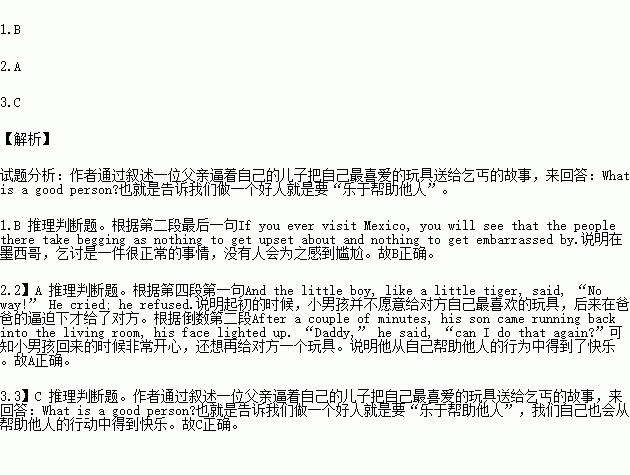题目内容
I was with a group of businessmen, and we were dealing with a question—What is a good person?
At a certain point during the discussion, one of the students—a young man of about 30—described an event that happened at Christmas. He and his five-year-old son were decorating the Christmas tree, and a little boy came to the front door begging. If you ever visit Mexico, you will see that the people there take begging as nothing to get upset about and nothing to get embarrassed by.
So, this little boy came to the door, a boy about the same age as my student’s son. The father and the son went to the front door, and the father went back with his five-year-old son and said to him, “Give him one of your toys.” At the words, the little boy quickly picked up one toy, and his father said to him, “No, no-give him your favorite toy.”
And the little boy, like a little tiger, said, “No way!” He cried; he refused. But the father, like a big tiger in a way, insisted gently, “No, you must give him one of your favorite toys.”
And finally the boy, with his head down, picked up a toy he had just gotten. The father waited in the living room, and the boy walked to the front door with the toy in his hand. The father waited and waited.
What do you think happened?
After a couple of minutes, his son came running back into the living room, his face lighted up. “Daddy,” he said, “can I do that again?”
I think I have got the answer to the question.
1.From the passage, we can learn that in Mexico ________.
A. begging is looked down upon
B. begging is considered as a normal part of life
C. visitors all over the world treat beggars kindly
D. few people are living a poor life
2. The sentence “Daddy, can I do that again?” showed that the boy ________.
A. got pleasure by helping the little beggar
B. wanted to please his father
C. began to like the little beggar
D. wanted to be the little beggar’s friend
3.According to the writer, “being a good person” means ________.
A. having the courage to correct his/her mistakes
B. being friendly to beggars
C. being ready to give
D. being able to teach children to tell right from wrong

